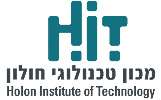Holon Institute of Technology
 | |
Former names |
Center for Technological Education Holon (CTEH) Holon Academic Institute of Technology (HAIT) |
|---|---|
| Motto | Quality and Excellence |
| Established | 1969 |
| Chairman | Moshe Bar-Lev |
| President | Prof. Eduard Yakubov |
| General Manager | Dov Peleg |
| Students | 3600 |
| Location |
Holon, Israel 32°0′51.56″N 34°46′25.75″E / 32.0143222°N 34.7738194°ECoordinates: 32°0′51.56″N 34°46′25.75″E / 32.0143222°N 34.7738194°E |
| Colors | |
| Website |
|
Holon Institute of Technology (HIT) (Hebrew: מכון טכנולוגי חולון), is an academic institution of higher learning in Holon, Israel. It focuses on teaching Science, Engineering, Applied Mathematics, Instructional Technologies, Design and Technology Management. HIT also deals with both theoretical and applied research and holds strong ties with the Israeli industry.[1]
HIT was the first college in Israel which was accredited to grant the B.Sc. degree (colleges in Israel used to grant only the B.Tech. degree). As other colleges receive accreditation, HIT became the first to be accredited to give the M.Sc. degree.
History
The Holon Institute of Technology was founded in 1969 by Abraham Margalith with the support of the mayor of Holon, Pinchas Eylon. In the belief that technical vocational training was not sufficient to prepare engineers to work in Israel's developing industry, Margalith envisaged HIT as an academic center for technological education combining academic study and practical experience in industry.[2]
It opened with 100 students as the Center for Technological Education Holon (CTEH). Until 2000, it was affiliated with Tel Aviv University. In 2000, it became an independent institution called the Holon Academic Institute of Technology (HAIT) and was recognized by the Council for Higher Education in Israel as an institute of higher education.[3] In 2006, it became the Holon Institute of Technology (HIT).
The HIT single campus in the center of Holon stretches over about 50 dunams (5.0 ha; 12 acres) and includes eight buildings, two of which were constructed in the last few years. The combined area of the first six buildings is over 15,000 square metres (160,000 sq ft).

Academic programs
The institute is one of two in Israel which offer career training and research in engineering and technology; the other is the Technion - Israel Institute of Technology in Haifa.
About 3,600 students study in HIT, in the following program:[1][3]
- Electrical Engineering: B.Sc. and M.Sc. (without thesis)
- Management of Technology: B.Sc. and M.Sc. (without thesis)
- Applied Mathematics: B.Sc.
- Computer Sciences: B.Sc.
- Design:
- Industrial Design: B.Design
- Interior design: B.Design
- Visual communications design: B.Design
- Integrated design: M.Design (without thesis)
- Instructional Systems Technologies: B.A.
Research
The HIT Research Authority singles out various research projects in Israel and abroad and raises funding and support for the research conducted by the Institute staff – usually in close cooperation with universities and research institutions in Israel and abroad.[4]
Relationships
HIT receives research grants from both local and international sources and conducts ongoing studies with numerous other institutions, including the Weizmann Institute of Science, the Technion, Tel Aviv University and Ben-Gurion University of the Negev. HIT also maintains cooperation agreements with international universities and institutions, including the Russian Academy of Science in Moscow, the Institute of Technology and Physics in St. Petersburg, the National Polytechnic Institute of Mexico and the University of Southern California.

See also
| Wikimedia Commons has media related to Holon Institute of Technology. |
References
- 1 2 "Holon Institute of Technology HIT, About". hit.ac.il. Retrieved 26 March 2014.
- ↑ Abraham Margalith (1916-1980) a man of vision and action
- 1 2 המועצה להשכלה גבוהה - מאגר מוסדות [Council for Higher Education Registry of Institutes]. che.org.il (in Hebrew). Retrieved 4 August 2010.
- ↑ "Holon Institute of Technology HIT, Research". hit.ac.il. Retrieved 6 April 2014.